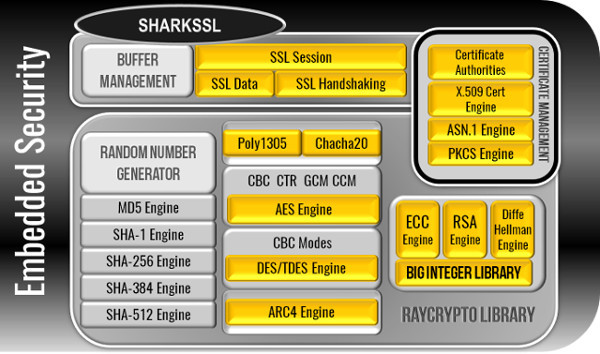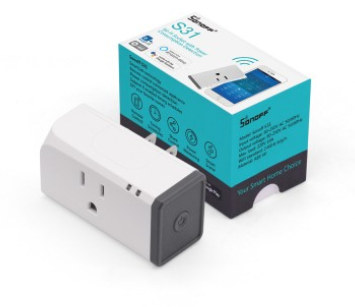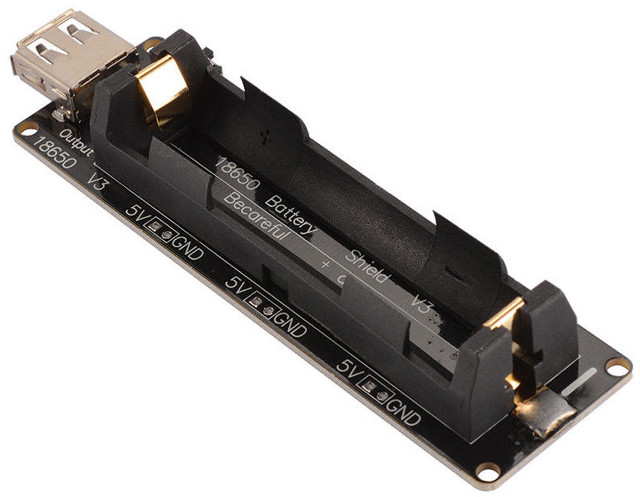A few months ago I reviewed ANAVI Light pHat for Raspberry Pi which allows you to control an LED RGB strip from the popular development board. However, if all you need is to switch the RGB LED light on and off, or change the color, the hardware is clearly overpowered for the tasks. So Leon ANAVI designed another board based on ESP8266 – ANAVI Light Controller – which does the same thing with lower cost and more power efficient hardware. Leon sent me a sample for review, so let’s see what we’ve got. ANAVI Light Controller Starter Kit Unboxing I received a package for the Starter kit that’s offered for $39 on CrowdSupply. We’ve got the main board, a USB debugging, an acrylic enclosure with screws and spacers, a one meter RGB LED strip, and some stickers inside the package. If we have a close look at the board we […]
Sonoff S26 Smart Socket Mini Review & Teardown
ITEAD Studio very recently launched their Sonoff S26 WiFi Smart plug as a more compact and cost effective upgrade to their Sonoff S20 smart sockets, and which comes in 6 different versions for China, Australia, the United Kingdom, the United States, Europe type F for Germany, Austria, the Netherlands, Sweden, Finland, Norway, Portugal, Spain and Eastern Europe, and Europe type E for France, Belgium, Poland, Slovakia, the Czech Republic, Tunisia and Morocco. You can find the one that suits you most on World Standard website. I was interested in getting the device, mostly to check the hardware design, so the company sent me one sample to try out. Sonoff S26 Unboxing Sonoff S26 comes is a white package with Sonoff branding. I received the US type plug (S26B model) which includes a ground pin on both side, so it’s not suitable for most sockets here in Thailand that do not […]
ESP8266 based ANAVI Light Controller can be Programmed with Home Assistant or the Arduino IDE (Crowdfunding)
ANAVI Technology previously launched a Light pHAT allowing for RGB Light strip connection to Raspberry Pi boards, and during my review of ANAVI Light pHAT with Raspberry Pi 2, it did the job, but if that’s all you want to do, the Raspberry Pi board is clearly oversized & overpowered for the job. So Leon ANAVI got back to the drawing board and designed a similar open source hardware board – called ANAVI Light Controller – with an built-in ESP8266 module that removes the need for a fully fledged Linux board. ANAVI Light Controller specifications: Wireless Module – ESP8266MOD module based on ESP8266 Tensilica L106 32-bit processor Connectivity – WiFi 802.11 b/g/n Expansion Terminal block for 12 V RGB LED strip 3x I2C headers for sensors Debugging – UART header Misc – Button Power Supply – 12 V via power barrel jack Dimensions – 75 mm x 40 mm Certification […]
ESP8266 Loader App Allows you to Flash and Debug ESP8266 Boards from Android Smartphones
In case you’d like to flash ESP8266 boards using a phone, you can now do so with ESP8266 Loader app for Android, which also gives you access to the serial console. All you’ll need to an Android smartphone with USB OTG support, a good USB cable, and a few ESP8266 boards such as Wemos D1 mini or NodeMCU. It should also be possible to use a TV box instead. Other listed features: Support any USB chip – CDC/ACM, FTDI, PL2303, CH34X and CP210X Change the SSID & password automatically durring upload No Ads (Pro version) Access to Google Drive storage (Pro version) Multiple upload widgets button (Pro version) That’s a free app with premium features, which also means it’s not open source, so any new features would have to be implemented by the developer. I asked him whether ESP32 boards were also supported, but he answered the app only works […]
Sonoff Pow R2 is a Power Monitoring WiFi Smart Switch with Better Accuracy, Safety and Extra Features
ITEAD Studio released several wireless switches / sockets with power monitoring capability over the years. Recently they company launched Sonoff S31 smart socket that plugs directly into your AC socket and does not require any wiring, but earlier they introduced Sonoff Pow that is meant to be connected directly into your circuit via terminals. ITEAD has now launched an upgrade to the latter – Sonoff Pow R2 – with many of the same features, including support for eWelink, but offering 99% measurement accuracy, overload protection defined by the user, and various other features like the ability to export data. Sonoff Pow R2 (Revision 2) specifications: WiSoC – Espressif ESP8266 (TBC) Connectivity – 802.11 b/g/n WiFi with WPA/WPA2 support Voltage Range – 90 to 250 VAC input Max Current – Up to 16A Max Power – 3,500 Watts Terminals – 6 terminal for mains and load’s ground, live and neutral signals. […]
Real Time Logic Releases Web-based SharkSSL FreeRTOS/lwIP ESP8266 IDE
Real Time Logic claims SharkSSL is the smallest, fastest, and best performing embedded TLS v1.0/1.1/1.2 solution. It works with ColdFire, Kinetis K60, all the Cortex-M3 and -M4 processors, as well as Tensilica LX3 based ESP8266. The solutions can be tuned via compile-time options to a less than 20kB footprint that still supports full x.509 authentication. SharkSSL is a commercial solution, but the SDK is free to use for non-commercial projects. In order to simplify development on ESP826, the company has released the SharkSSL ESP8266 IDE running in a virtual machine, and providing a complete FreeRTOS and lwIP based development environment using a web based interface. Once you’ve downloaded the virtual machine image, you can start it in VirtualBox or VMWare with bridged networking enabled. The IP address of the virtual machine will be shown in the console, and you can use it in your favorite web browser in the host […]
Sonoff S31 Smart Socket Review – Power Consumption Monitoring with eWelink Android App
Today we are looking at the Sonoff S31. It is another device in the Sonoff line by ITEAD Studio. Similar to the Sonoff POW, you can see power usage but on the S31 you can keep historical data up to 100 days. This time around I am using it with the standard firmware, and will not be flashing the popular MQTT Tasmota firmware. Specifications per ITEAD website: Max. Current: 16A Voltage Input: 90~264V AC, 50/60HZ Wireless Standard: 2.4GHz, 802.11 b/g/n Receive Sensitivity: 802.11b: <-84dBm(11Mbps); 802.11g: <-68dBm(54Mbps) Output Power: 802.11b:16±2dBm; 802.11g:13±2dBm Security Mechanism: WEP/WPA-PSK/WPA2-PSK Encryption: AES/TKIP Working Temp: -20 °C ~ 75 °C Working Humidity: 10%-80% Product Dimensions: 75.7×39.7x32mm Gang: 1 Weight: 135g Certification: FCC (Download) Sonoff S31 Unboxing & Teardown Taking the S31 apart is rather easy but I did not take it fully apart for fear of breaking it. Just pop the power button off the left side. Then […]
$2 USB “18650 Battery Shield” Powers Arduino, ESP32, and Other Low Power Boards with a 18650 Battery
If you’re looking for battery power for one of your projects, you may consider a “18650 battery shield” – going for just above $2 on Aliexpress or eBay – for powering Arduino boards, Espressif ESP8266 or ESP32 boards, or any board that can be powered by 5V up to 2A via USB or headers, or by 3V up to 1A via headers. Specifications listed on eBay/Aliexpress: Power Input – 5 to 8V via micro USB port up to 0.5A charging Power Output 5V via Type A USB port 3V up to 1A via 3x 2-pin header 5V up to 2A via 3x 2-pin headers Misc – 1 switch control USB output, LED for charging status (green = full, red = charging) Battery protection (Over-charge or Over-discharge) Dimensions – 9.8 x 2.9 cm You’ll need to add your own 18650 battery, and be careful about polarity while installing it, since putting […]










